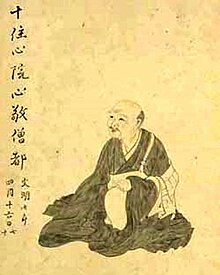|
Shinkei
Shinkei (心敬, 1406 – 14 May 1475)[1] was a Japanese Buddhist priest and poet (tanka and renga poetry). Life and workShinkei was born in Taisha, Kii Province (now Wakayama, Wakayama Prefecture) in 1406. He was a Buddhist priest at an early age and quickly rose to the rank of Daisōzu (大僧都, Senior Director).[2][1] He regarded poetry as the result of a religious way of life (shugyō).[3] For more than thirty years he remained a student with the poet Shōtetsu. His poems are based on the Japanese aesthetic ideal called yūgen (幽玄).[4][2] He also wrote the poetic treatises Sasamegoto (ささめごと) in 1463 and Oi no kurigoto (老のくりごと) in 1471.[1][3] Shinkei died on 14 May 1475 in Ōyama, Sagami Province (now part of Kanagawa Prefecture). Translations in EnglishEsperanza Ramirez-Christensen translated and annotated Shinkei's Sasamegoto under the title Murmured Conversations: A Treatise on Poetry and Buddhism by the Poet-Monk Shinkei (Stanford University Press, 2008), which received the Japan–U.S. Friendship Commission Prize for the Translation of Japanese Literature in 2009. Ramirez-Christensen also published a book-length study on Shinkei's life and poetry titled Heart's Flower: The Life and Poetry of Shinkei (Stanford University Press, 1994).[5] References
|
||||||||||||||||||
Portal di Ensiklopedia Dunia
